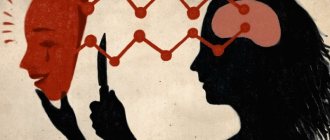What is delinquent behavior?
Delinquent behavior is a type of antisocial behavior in which a person regularly commits acts that cause harm to society and are considered offenses. In this case, the goal is often the illegal action itself, and not obtaining any benefit. The word "delinquent" comes from the Latin delinquens (criminal, delinquent).
Delinquent behavior is an important subject of study for sociology, pedagogy, psychology, criminology and other sciences. One of the most important goals is to promptly stop illegal actions without limiting the rights of individuals prone to such behavior. In particular, a big problem is the delinquent behavior of adolescents, for many of whom this period of life can become a turning point.
A characteristic feature of delinquent behavior is that it causes public outcry and condemnation. It is condemned in any society. At the same time, there are special legal institutions, the main task of which is to create conditions in which individuals prone to delinquent behavior would not commit offenses.
Delinquent and deviant behavior should not be confused. Both concepts imply that a person violates the norms and rules accepted in society. But deviant behavior is usually not associated with crimes and does not entail criminal or administrative punishment. In fact, delinquent behavior is always a type of deviant behavior, but not vice versa.
Signs
Signs of delinquent behavior:
- Antisocial nature of the act. A citizen commits actions that are aimed at violating the existing foundations, norms of morality and ethics in society.
- Violation of the law. The actions taken are not only antisocial, but also criminal in nature.
In addition to violating unwritten social principles, an unlawful act is also committed, entailing legal liability. - Demonstrativeness .
As a rule, actions are demonstrative in nature. When committing them, the criminal seeks to attract attention to himself and cause condemnation from society. - Awareness of actions . In most cases (except for cases where the offender is declared incompetent), the offender is fully aware that his actions are illegal.
Signs of delinquent behavior
Delinquent behavior is manifested in violations of the law, for which administrative or criminal liability is provided. It differs from ordinary criminal activity by the motives that force the criminal to commit illegal actions. To better understand what delinquent behavior is, it is advisable to remember the key signs of this phenomenon:
- Causing material or other damage. A characteristic feature of delinquent behavior is that actions are aimed specifically at causing harm. Such a person can break a window, throw an unextinguished cigarette butt into a trash can, or puncture a car tire. At the same time, he does not receive any benefit, but feels satisfaction from his action.
- Deliberate violation of the law. When committing a delinquent act, a person is usually well aware that his actions imply criminal or administrative liability.
- Antisocial nature of actions. Such actions often express a protest against existing norms and rules adopted in a given society.
- Demonstrativeness. As a rule, a person does not seek to hide his misdeeds, but commits them in such a way that they are seen by both those who will approve of them and those who will condemn them.
- The desire to attract attention. This is one of the main goals of delinquent behavior. A person wants to be discussed, even if it is discussed in a negative way.
A person exhibiting delinquent behavior does not necessarily have to be a sociopath. He may find it difficult to harm a specific person, so his actions usually harm public order, public or private property. If he damages someone’s property (for example, punctures a car tire), he usually justifies himself by allegedly punishing a person who has earned a lot of money through dishonest means.
Differences between delinquent and deviant behavior
Delinquent and deviant behavior are variants of an individual’s protest against social norms and rules. Both of these models are condemned by society. The motive for deviant and delinquent acts is the individual’s desperate attempts to adapt to life in society and to achieve the desired socio-psychological status in the team. However, there are not only similarities, but also differences between these forms of behavior.
Deviant behavior is based on a violation of the cultural norms and rules of only one social group, so it is usually considered relative. Those actions that are perceived as immoral in one social group will be considered completely acceptable in another group. Everything depends on the cultural level of the social community in which these actions are performed. Delinquent behavior represents a violation not only of intra-group norms and rules, but also of state principles, therefore it is considered absolute. Moreover, the content of the concept of “deviation” is much broader than the content of the concept of “delinquency”.
The measure of permissible actions in deviant behavior are social norms and standards. There are no sanctions for deviations at the legislative level. The main method of correcting them is educational conversations with the teenager, explaining the negative consequences of his actions. The measure of permissible actions in delinquent behavior is the law. Sanctions for torts include administrative or criminal liability.
Thus, the main difference between delinquent and deviant behavior can be considered the severity of the consequences of illegal actions for the person who commits them and for the people around him.
Types of delinquent behavior
Psychologists identify three main manifestations of delinquent behavior:
1. Disciplinary misconduct. A person deliberately violates labor discipline, causing damage to the organization for which he works. At the same time, he always comes up with excuses for himself, which are usually based on the fact that he is underpaid or is not provided with proper working conditions.
2. Administrative offenses. This type includes all kinds of violations of public order that imply administrative liability: hooliganism, noisy behavior in the dark, drinking alcohol and smoking in places where it is prohibited, obscene language, violating traffic rules, etc.
3. Criminal offenses. This category includes the acts listed in the Criminal Code. Crimes include offenses that cause serious damage to someone else's property, health or life.
In addition, addiction can be a sign of delinquent behavior. Although it is a deviation, it should be taken as an alarm bell. Addictive behavior includes alcoholism, drug addiction, gambling addiction, as well as sexual, food and other addictions. Habits themselves are not crimes, but they often provoke them.
Causes of delinquent behavior
From a psychological point of view, delinquent behavior rarely results from a single cause. Usually it is caused by a combination of several factors of different nature. Psychologists divide the causes of delinquent behavior into three groups: psychophysiological, family and social. Let's look at each group in more detail.
Psychophysiological factors:
- personality and character type;
- presence of dependencies;
- transitional age;
- mental disorders.
Family factors:
- parental divorce;
- dysfunctional family situation (quarrels, domestic violence);
- loss of a dear relative or loved one;
- alcoholism, drug addiction, gambling addiction and other bad habits of one of the family members;
- overprotection and excessive control on the part of parents.
Social (socio-economic) factors:
- lack of education and good job;
- lack of funds;
- problems of social and material inequality;
- national and ethnic contradictions;
- finding yourself in an unusual social environment.
Psychophysiological factors usually serve only as prerequisites, but it is family and social circumstances that provoke delinquent behavior.
Why teenagers become delinquent
Impunity is one of the reasons for this behavior
There are many reasons that can lead to this type of behavior. According to statistics, people from disadvantaged families are most often prone to this lifestyle. There are situations when teenagers and young people who live in abundance and have all the opportunities for a prosperous life scenario begin to behave in an illegal manner. Often the reasons are observed in combination.
Delinquents can become such for internal reasons. This is due to their moral attitudes and type of temperament. For example, choleric people are prone to such impulsive actions. Illegal behavior in society also leads to:
- addictions;
- increased or, conversely, decreased anxiety;
- various mental disorders that are transmitted genetically and much more.
External reasons that may prompt a teenager to commit such acts include:
- lack of funds;
- serious conflicts due to rejection in a certain environment;
- unfavorable social environment;
- changes in society, for example, crises and revolutions.
Lack of legal literacy may also be a factor. If teenagers know about serious criminal acts and understand that they can be sent to prison, then they may not even know about punishments for other categories of offenses.
The climate in the family and the parents’ approach to education influences many things
Often the reasons lie within the family. Negative factors that create a tendency towards this type of behavior include:
- various dependencies of one of the family members or all;
- permissiveness and indifference towards the child;
- overprotective control;
- conflict situation within the family, including the use of physical violence;
- parental divorce;
- lack of any educational measures and communication.
All of these factors, individually or in combination, can lead to a child feeling useless. Increasing internal resentment results in aggression. It is her child who directs it outward.
If, against the backdrop of such a picture within the family, a teenager falls into bad company, his risk of becoming a delinquent increases many times over.
Differences from deviant behavior
To accurately understand what delinquent behavior is, it is important to be able to distinguish it from deviant behavior. First of all, there are three main differences to remember:
- Deviant behavior is directed against generally accepted rules. Delinquency is directed against law and order.
- Deviant behavior is determined by public opinion, morality and ethics. Delinquent behavior is defined by criminal and administrative law.
- Deviant behavior often involves conflict with specific people (parents, teachers). Delinquent behavior is directed against society and public order as a whole.
As noted above, delinquent behavior is a type of deviant behavior, but not vice versa. The main difference is whether the person seeks to cause harm to society and public order. Delinquent behavior usually involves a violation of criminal or administrative law. The actions committed in this case are called torts (from the Latin delictum - “misdemeanor”), and the criminal himself is called a delinquent.
Delinquent behavior of adolescents
The tendency of adolescents to engage in this type of behavior is a big problem in modern society. Against the background of a general increase in the well-being of citizens and a decrease in the crime rate, the number of crimes committed by teenagers remains quite high. The important thing is that committing a crime at a young age, as a rule, determines the rest of a person’s life.
At the same time, teenagers have not yet developed moral and moral guidelines; they do not realize responsibility for their future life. Therefore, law enforcement agencies, teachers and psychologists must work together to ensure that juvenile crime is minimal.
The main features of delinquent behavior in adolescents:
- the main reason for delinquent behavior is the denial of the authority of adults and the fight against the rules they impose;
- offenses are most often committed by groups of teenagers, since they perceive them as a way of socialization;
- in adolescence, a person has the highest tendency to addiction;
- the psyche of adolescents is unstable, they are prone to taking risks and committing impulsive acts without considering the consequences;
- Teenagers do not have enough life experience and no understanding of responsibility.
Lack of experience, lack of moral and ethical principles develop in adolescents with their impulsiveness, desire to stand out and demonstrate their importance. Therefore, they themselves cannot always explain the reasons and motives for their actions. For example, while asserting himself through bullying and other offenses, a teenager himself does not understand why he is doing this. But at the same time, he feels more significant; it seems to him that in this way he strengthens his authority within the social group.
Prevention
You definitely need to be aware of who your child is communicating with.
Preventive measures must come from within the family. Parents are obliged to create a favorable emotional climate and give the child an understanding that he is needed and important. At the same time, the teenager must understand that he does not have the right to behave as he pleases towards other people, causing them harm.
During periods of crisis, a teenager needs to be explained what is good and what is bad. Parents should respond to their children’s requests, be aware of their lives, affairs and hobbies, but at the same time not try to strictly control them. The latter can cause rejection in the child and a desire to do exactly the opposite.
Parents are required to monitor the company in which their child communicates. If he has fallen under the influence of bad guys, you need to gently but firmly discourage him from this, occupying his free time with other useful and interesting things for a teenager.
Educational work should be carried out at the level of educational institutions. It is important for the latter to improve legal culture and literacy among the younger generation.
Prevention of delinquent behavior
As you know, people do not always become hardened criminals after their first offense. But almost always they become so after imprisonment. This statement is especially true for the post-Soviet space. Therefore, preventing delinquent behavior in children and adolescents is much more important than punishing those who have already committed crimes.
Basic measures to prevent delinquent behavior:
- prosperous family relationships, peaceful resolution of problems, absence of aggression and domestic violence;
- refusal to watch films, TV series and programs that romanticize criminal activity;
- improving the quality of education, increasing academic performance;
- the child must receive more positive emotions from parents and teachers in order to understand that they are not his enemies.











